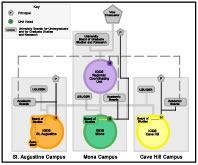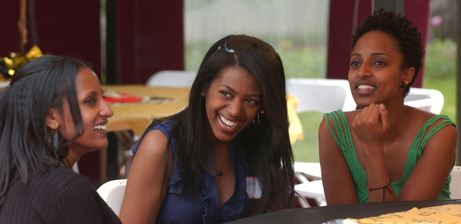
1960's - 1970's |
Women´s Movement creates global momentum for change. |
1975 - 1985 |
UN Decade of Women – Activities intensified to improve the status of women and transform gender relations. |
1977 |
Regional seminar on The Integration of Women in Caribbean Development, in Jamaica recommends establishment of a “Women and Development Unit” at the University of the West Indies. |
1970 -1982 |
Women in the Caribbean Project (WICP) This regional project was developed and implemented. It generated valuable data on women in the Caribbean which was published. Meeting of regional educators was hosted by WAND and WICP in Barbados that recommended establishment of a multi-disciplinary teaching programme at the UWI within a five-year period. Women and Development Studies (WDS) Groups formed on the three UWI campuses comprised of women and men at UWI. The aims were to: increase knowledge of gender issues in the Caribbean; prepare an integrated, interdisciplinary programme of Women/Gender and Development Studies and link teaching research and outreach. |
1986 |
Gender in Caribbean Development, Inaugural Seminar. This was organized by the WDS Group, St. Augustine in September 1986 and it informed the agenda for change.. |
1992 |
WDS 10th The institutionalisation of Gender and Development Studies (G&DS) took place in September 1993 when the Centre (CGDS) was established. Prior to that, the initiative for the introduction of programmes in G&DS was led by the Women and Development Studies Groups (WDSGs). The project which provided the funding to these groups was from the Government of the Netherlands (GON) which supported collaboration between UWI WDSGs and the Institute for Social Studies (ISS) in The Hague The ISS provide technical assistance and support in a variety of ways. There were two (2 )phases to this project: the first from 1986 to 1990 and the second from 1990 to 1994. One of the objectives of the project was the institutionalisation of the programme in G&DS at the UWI. . |
1993 |
CGDS was instituted at UWI (September 1, 1993). |
2003 |
UWI Mona Academic Conference entitled: Gender in the 21st Century was held to mark the 10th anniversary of the establishment of Gender and Development Studies at the UWI. |
2008 |
In October 2008, the UWI Council gave approved to upgrade the status of the CGDS from Centre to Institute able to grant its own undergraduate and postgraduate degrees. In November, the 15th anniversary of the establishment of Gender and Development Studies as a teaching and research Centre at the UWI was observed with a two-day regional symposium from November 10-11, 2008 in honour of Professor Elsa Leo-Rhynie entitled : Gender Perspectives in Education: Caribbean Impact, Global Reach, for her contribution to scholarship and administration at the institution. It also commemorated and reflected on the genesis, development and future direction of Gender and Development Studies at UWI. The event was incorporated into the UWI's 60th anniversary celebrations. |
2009-2010 |
Full implementation of the Major (BSc in Gender and Development) following approval in 2008/2009. |
2013 The CGDS celebrates two decade of institutionalization with the University of the West Indies structure. 20th Anniversary Conference in honour of Professor Barbara Bailey is convened from November 6-8, 2013 on St. Augustine Campus: Continuities, Challenges and transformation in Caribbean Gender Relations.






